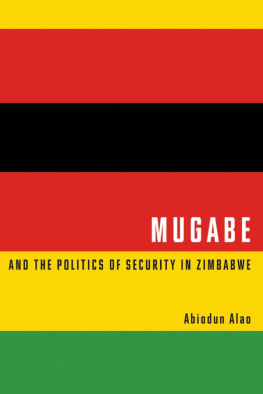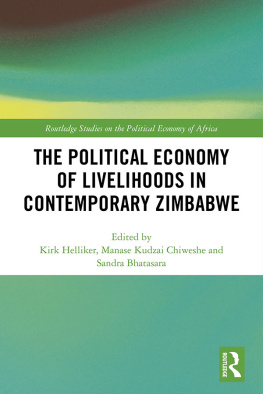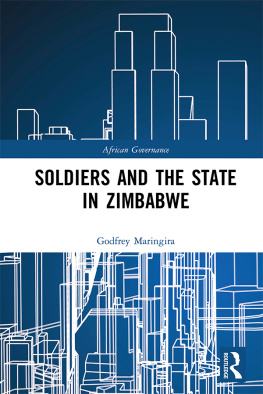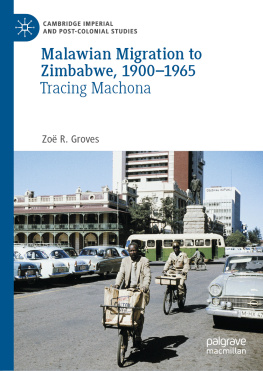
Economic Dualism in Zimbabwe
This book identifies the root causes of income inequality in underdeveloped economies and proposes new solutions for structural reform in economies that have long neglected and exploited working people. It focuses on the case of Zimbabwe, a classic example of an African post-colonial state continuing with dualistic economic structures while simultaneously laying the blame for the initiation of this form of underdevelopment with colonialism. The book explores the colonial roots of economic dualism, in which traditional sectors run alongside newer forms of wage employment, and suggests ways for Zimbabwe to move beyond the ingrained inequalities and asymmetries in production and organisation that it generates.
Using a combination of theoretical and empirical approaches, EconomicDualism in Zimbabwe demonstrates how economic dualism can be eliminated through structural transformation of the traditional agricultural sector and reallocation of labour across sectors. The author comprehensively discusses the origins of dualism in Zimbabwe, how it developed in land, labour, credit and financial markets, who stands to gain and lose from it, and ultimately what reforms are needed to eliminate dualism from the economic system. The book aims to complement efforts made by both North and South to transform this structurally embedded cause of underdevelopment and seeks to motivate change in the collective development agenda mindset.
This book will be of interest to graduate-level students, scholars, researchers and policy practitioners in the fields of Development Studies, Economics, Agricultural Policy, Labour Policy, Economic Planning and African Studies.
Daniel B. Ndlela is a Lead Researcher and Team Leader with Zimconsult, Zimbabwe, formerly taught economics at the University of Zimbabwe, and was Senior Regional Adviser on economic co-operation and integration for the United Nations Economic Commission for Africa (UNECA).
Routledge Studies in African Development
Political Transition and Inclusive Development in Malawi
The Democratic Dividend
Edited by Dan Banik and Blessings Chinsinga
National Liberation Movements as Government in Africa
Edited by Redie Bereketeab
Hunger and Poverty in South Africa
The Hidden Faces of Food Insecurity
Jacqueline Hanoman
Extractive Industries and Changing State Dynamics in Africa
Beyond the Resource Curse
Edited by Jon Schubert, Ulf Engel and Elsio Macamo
Peacebuilding in Contemporary Africa
In Search of Alternative Strategies
Edited by Kenneth Omeje
The Challenge of Governance in South Sudan
Corruption, Peacebuilding, and Foreign Intervention
Edited by Steven C. Roach and Derrick K. Hudson
African Peacekeeping Training Centres
Socialisation as a Tool for Peace?
Anne Flaspler
Corporate Governance in Tanzania
Ethics and Accountability at the Crossroads
Peter C. Mhando and Andulile J. Mwakalyelye
Economic Dualism in Zimbabwe
From Colonial Rhodesia to Post-Independence
Daniel B. Ndlela
Economic Dualism in Zimbabwe
From Colonial Rhodesia to Post-Independence
Daniel B. Ndlela
First published 2019
by Routledge
2 Park Square, Milton Park, Abingdon, Oxon OX14 4RN
and by Routledge
52 Vanderbilt Avenue, New York, NY 10017
Routledge is an imprint of the Taylor & Francis Group, an informa business
2019 Daniel B. Ndlela
The right of Daniel B. Ndlela to be identified as author of this work has been asserted by him in accordance with sections 77 and 78 of the Copyright, Designs and Patents Act 1988.
All rights reserved. No part of this book may be reprinted or reproduced or utilised in any form or by any electronic, mechanical, or other means, now known or hereafter invented, including photocopying and recording, or in any information storage or retrieval system, without permission in writing from the publishers.
Trademark notice: Product or corporate names may be trademarks or registered trademarks, and are used only for identification and explanation without intent to infringe.
British Library Cataloguing-in-Publication Data
A catalogue record for this book is available from the British Library
Library of Congress Cataloging-in-Publication Data
Names: Ndlela, Daniel Boda, editor.
Title: Economic dualism in Zimbabwe : from colonial Rhodesia to post-independence / edited by Daniel B. Ndlela.
Description: Abingdon, Oxon ; New York, NY : Routledge, 2019. | Series: Routledge studies in African development | Includes bibliographical references and index.
Identifiers: LCCN 2019005035 (print) | LCCN 2019007405 (ebook) | ISBN 9780429054921 (eBook) | ISBN 9780367150860 (hardback)
Subjects: LCSH: Economic developmentZimbabweHistory. | ZimbabweEconomic conditions. | ZimbabweEconomic policy.
Classification: LCC HC910 (ebook) | LCC HC910 .E26 2019 (print) | DDC 330.9681dc23
LC record available at https://lccn.loc.gov/2019005035
ISBN: 978-0-367-15086-0 (hbk)
ISBN: 978-0-429-05492-1 (ebk)
Typeset in Goudy
by Wearset Ltd, Boldon, Tyne and Wear
For my wife, Thando, and my sons, Kwazakele, Mongezi and Mlandeli.
Contents
Background
In setting the foundations of the present book, the introduction chapter locates economic dualism from colonial Rhodesia in both its historic and geographical location terms at the end of the nineteenth century, as having formed the foundation and cradle of its distorted economic structure and underdevelopment, which has continued to be so well into the twenty-first century. The chapter also spells out the origin and central task of the study of dualistic development in the Zimbabwean economy.
With a land area of approximately 390,000 square kilometres,1 Zimbabwe is bordered by Mozambique to the east, South Africa to the south, Botswana and Namibia (the Caprivi Strip) to the west and Zambia to the north and north-west. Zimbabwes distinctive physical characteristic is the high plateau, the high-veld that runs from the south-west to the north-east through the centre of the country; it is about 650 kilometres long and 80 kilometres wide and lies mostly on an altitude of between 1,200 and 1,500 metres above sea level. Areas on both sides of the plateau lying at an altitude between 600 and 1,200 metres are called the, middleveld, and the lowest part at an altitude below 600 metres, the low-veld, which consists of the Zambezi Valley, the Limpopo Valley and the Sabi Basin.
The climate corresponds to the altitude pattern with temperate climate in the high plateau and middle-veld and more extreme temperature variations in the low-veld. The countrys natural regions strongly influence the pattern of agricultural cropping. As will be seen, land distribution under the colonial rule also followed the landscape and the climatic variations as well as the natural resource endowment patterns. Thus, the majority of the African settlements were moved from the high- and middle-veld areas to the generally arid low-veld, where both agricultural cropping and livestock farming are hazardous for lack of rainfall and vegetation. On the other hand, the plateau became the centre of European settlement because of its good climate, rainfall, vegetation and proximity to most of the commercial mineral deposits.










